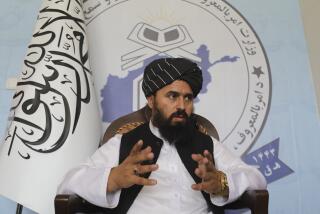Taliban Keeps Peace With Non-Muslims
- Share via
KABUL, Afghanistan — A holy man prays over the Guru Granth Sahib, the holiest of books for Sikhs.
Behind him a gentle voice sings an Asian classical song, called a raag. The rhythms of the harmonium and the beat of the tabla drums mingle with the whispers of early evening worshipers.
In a synagogue a rabbi sways gently before the Torah, the Jewish holy book that is wrapped in a blue shroud embossed in gold thread.
Such things happen every day in cities around the world.
But these are happening in Kabul, Afghanistan’s shattered capital, where the ruling Islamic Taliban army is not known for tolerance in its hard-line approach to religion.
Its soldiers have cut off the hands of thieves, forced women off the job, publicly beat women for not wearing the mandatory burqa and staged grisly public executions.
They have banned music, most games, kite flying, videos and just about all forms of entertainment. Paper wrapping is forbidden because it might contain recycled pages of the Koran, Islam’s holy book.
*
But for adherents of Afghanistan’s minority religions--Sikhs, Hindus and Afghanistan’s last Jew--the Taliban has not been a source of trouble.
Taliban leaders say it is their job to keep the followers of Islam on the correct path and not to worry about those of other religions.
Abdul Rehman Ottaki, deputy minister of information and culture, said the Taliban government realizes its “responsibility to take care of them [minorities] to keep Afghanistan unified.”
“All Afghans who are our nationals, including Uzbeks, Tajiks, Shiite Muslims, Pathans, Hindus, they all have equal rights in front of the Islamic Emirate of Afghanistan,” Ottaki said.
For Sikhs and Hindus, who once worshiped at five temples in Kabul, including one that was 300 years old, it was the Taliban’s opponents who caused them grief.
All but one of the temples straddled the front line during factional fighting between former defense chief Ahmed Shah Massood and his biggest rival, Gulbuddin Hekmatyar.
The warren of narrow streets now lies in ruins, a testament to the bitter combat that killed nearly 30,000 people in Kabul between 1992 and 1996, when Taliban troops captured the city.
In the only temple still standing, Sikhs and Hindus gather each night as the sun sets. A brightly polished harmonium, which resembles a tabletop accordion, and a small set of drums called tablas appear.
Musicians, wearing the turbans that identify them as Sikhs, sit on pillows at one end of the expansive marble-floored hall. The music begins softly, the sound gently caressing the listeners who sway to the rhythm.
It’s an eerie sensation to hear the strains of an evening raag in a city where listening to music is a crime that carries a mandatory lashing.
But not for Sikhs and Hindus.
They skirt the ban on music by telling the Taliban that it is their form of worship.
“Like Muslims pray five times a day, we sing our songs in the afternoon,” said Sarang Singh. “The Taliban sometime come and just sit and listen. Some say, ‘I don’t understand it. I just like it.’ ”
Singh said Taliban soldiers are not a threat to them.
“We are not feeling afraid of the Taliban. We are not separate people,” he said. “We are from this country.”
*
For Afghanistan’s Jews the trouble began 20 years ago, in 1977, with the arrival of the communists and the Russian invasion two years later.
A closely knit community of barely 100 families, Afghanistan’s Jews believed the communists were a bad omen, said Rabbi Ishaq Levin, who has no proof of his age but guesses it’s about 85.
Levin celebrates all the Jewish festivals--Rosh Hashanah, Yom Kippur, Hanukkah, Passover and Purim--alone.
He is the last Jew in Afghanistan. His family lives outside Tel Aviv in Israel, and his neighbors-- all Muslims--watch out for him. They shoo away would-be visitors on the Jewish Sabbath, admonishing them: “This is a prayer day for his religion. Come back tomorrow.”
Levin refuses to leave Afghanistan. He says he can’t, because he is the custodian of the Torah. But the Torah isn’t his biggest worry. It’s the synagogue.
“This is our holy place, and all the belongings of the Jews who left are here,” he says.
Those possessions are meager-- old pots, pans, a rusted kettle, boxes of moth-eaten clothes, ragged carpets and dusty bundles in a heap on the floor.
The synagogue is a stark, cavernous cement room, but Levin says it has all it needs--a Hebrew inscription on the door that he kisses each time he passes.
Levin has had his run-ins with the Taliban, but not for his religion. Rather, it is the many women who visit his home. They come fully covered in a burqa to have their palms read. Others want the potions he prescribes to aid in love, sickness and health.
It’s a living, says Levin, who has been reading palms for the better part of 50 years.
“I will probably die here. This is my home,” he said.
More to Read
Sign up for Essential California
The most important California stories and recommendations in your inbox every morning.
You may occasionally receive promotional content from the Los Angeles Times.













